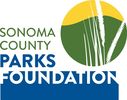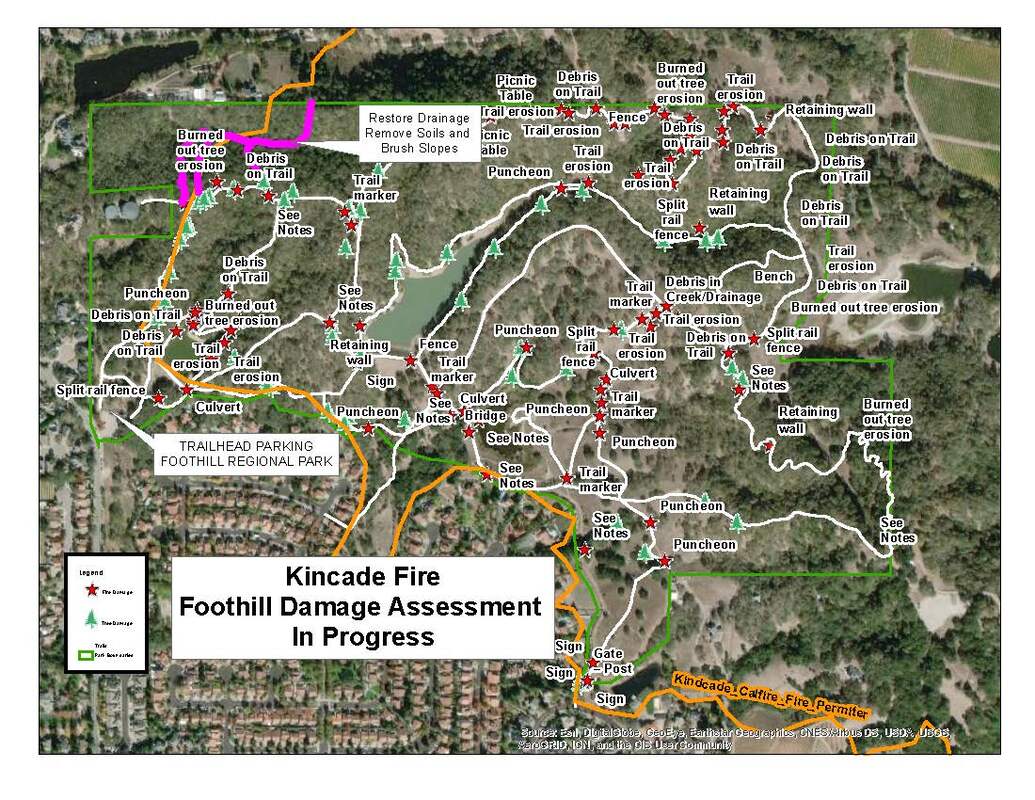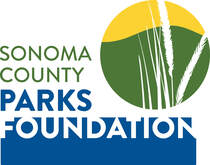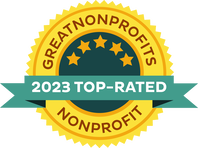Give back to fire-ravaged Foothill Regional Park
Foothill Regional Park in east Windsor is a 211-acre wilderness park in the foothills of the Mayacamas Mountains. In October 2019, it became the front line of the fire fight to save the community of Windsor, giving first responders open space to stage their resistance. With crews snaking miles of fire hoses into the park, their ability to hold back the flames at Foothill averted tragedy for thousands of Sonoma County residents.
About 95 percent of the park burned, partly from the wildfire and partly from the suppression fires that buffered neighborhoods from advancing flames. The Kincade Fire burned grass and brush and charred the trunks of Foothill's iconic oaks, but many of the trees will survive and recover. It's the man-made park infrastructure that mostly needs our attention now. Since the fire, Regional Parks has been assessing damaged bridges, trails, fences, signs, tables and other features and making plans to repair or replace them. In the course of restoration, Regional Parks will explore new "climate durable" strategies, such as the use of stone instead of wood for foot bridges and metal instead of plastic for culverts.
The fire destruction at Foothill, while unfortunate, presents an opportunity to transform a heavily used open space and revitalize this beloved park.
About 95 percent of the park burned, partly from the wildfire and partly from the suppression fires that buffered neighborhoods from advancing flames. The Kincade Fire burned grass and brush and charred the trunks of Foothill's iconic oaks, but many of the trees will survive and recover. It's the man-made park infrastructure that mostly needs our attention now. Since the fire, Regional Parks has been assessing damaged bridges, trails, fences, signs, tables and other features and making plans to repair or replace them. In the course of restoration, Regional Parks will explore new "climate durable" strategies, such as the use of stone instead of wood for foot bridges and metal instead of plastic for culverts.
The fire destruction at Foothill, while unfortunate, presents an opportunity to transform a heavily used open space and revitalize this beloved park.
Regional Parks' planners have already begun mapping the areas for restoration. In its pre-fire state, Foothill had nearly 7 miles of multi-use trails covering varied terrain, offering easy to challenging options for hikers, dog walkers, mountain bikers and equestrians. The park has thick oak woodlands, rolling hillsides, ridge-top views of northern Sonoma County, three ponds for bass and bluegill fishing, grassy meadows, and spring wildflowers. Your gift to Foothill Regional Park will help restore the park and also make it more resilient for the future.
Kaiser Permanente grants $500,000 for Foothill Fire Recovery
This funding will allow Sonoma County Regional Parks to renovate the 211-acre park with a new “climate-adaptive” design to make it more resilient to future wildfires and offer greater protection to surrounding neighborhoods.
The grant will also support the addition of community amenities in the popular park, including the construction of outdoor classrooms and gathering areas, an artistic entryway created by local students, and trail enhancements constructed by youth crews mentored by parks staff.
In October 2019, Foothill Regional Park was the frontline in the fight to contain the Kincade Fire, the second wildfire in three years to threaten Sonoma County. Firefighters snaked miles of hoses through the park's woodlands and bulldozed fire breaks in its open spaces. Their efforts kept the fire from burning through adjacent subdivisions and into the town. However, 95 percent of the park was burned or damaged, including 4 miles of trails, eight trail bridges and a 40-foot bridge that provides access to the park’s back country.
“It’s important for us to recognize that wildfires are occurring more frequently in Sonoma County and for us to take the initiative to make our parks and communities better prepared,” said Sonoma County Regional Parks Director Bert Whitaker. “Many parks haven't been designed with fire in mind. Since we are all facing the same existential climate threat, we hope Foothill will become a model for the Western United States.”
Climate-adaptive design means adjusting construction materials and techniques to be more resilient to future climate changes. At Foothill, this includes replacing wooden infrastructure like retaining walls and footbridges with fire-proof materials like metal or stone, or replacing plastic culverts with metal ones.
It also means introducing new features that support firefighting, like buried water lines to enable fire crews to access water from the park’s three ponds and redesigning some trails with cleared borders to accommodate fire truck or bulldozer access without damaging sensitive ecological and historical resources.
“At Kaiser Permanente, we recognize good health extends far beyond the doctor’s office. Where we live and how we live has a significant impact on our health and well-being, and we believe that good health is a fundamental right for all,” said Tarek Salaway, senior vice president and area manager, Kaiser Permanente Marin-Sonoma. “That is why we focus on making real and lasting change for the people who live, learn, work, and play in the communities we serve. Not only does this project fit Kaiser Permanente’s preventive health strategy of active living but it is also part of our fire recovery efforts to rebuild the health and vitality of Sonoma County and to restore the sense of community among residents who were affected by the fires.”
Over 100,000 people visit Foothill Regional Park annually, a number on the rise during the COVID-19 pandemic. Supported by this grant, Sonoma County Regional Parks will employ local young adults in fire resilience projects, including trail construction and vegetation management, through its Career Pathways Youth Crew program. This program helps young people – most of whom have faced challenges in their lives – develop work-readiness skills under the mentorship of parks staff.
Local students, mentored by artists, will be tapped to create the centerpiece of the park’s redesigned entrance, celebrating the park’s revival and community’s healing. Additionally, two new outdoor “classrooms” will create gathering spaces for future school field trips or community meetings and become venues for increasing wildfire awareness and environmental education.
“We are deeply grateful to Kaiser Permanent for this generous grant,” said Melissa Kelley, executive director of the Sonoma County Regional Parks Foundation. “Rebuilding and strengthening the parks damaged by wildfire is a top priority for the Foundation, especially through funding programs that support at-risk community members, seniors and youth, and enhance the social networks that are so crucial to a community’s disaster resiliency."
Grant funding from Kaiser Permanente will be matched with $50,000 in individual donations to the Sonoma County Regional Parks Foundation for fire recovery, a $15,000 donation from the Rotary Club of Coronado and facilitated by the Rotary Club of Windsor, and revenue from the Measure M parks sales tax approved by Sonoma County voters in 2018.
“Often we rely on the past to guide our decisions about the future. It can be difficult to justify additional investments to guard against disasters that may seem unlikely,” said Sonoma County Risk Manager Janell Crane. “But climate change is here and the effects are real. We can’t afford not to act. Taking the opportunity now to make infrastructure investments will payoff by improving the safety of the greater community and mitigating future damage to our valuable resources.”
Climate-adaptive work is currently underway at Foothill Regional Park and is expected to last through October 2022.
The grant will also support the addition of community amenities in the popular park, including the construction of outdoor classrooms and gathering areas, an artistic entryway created by local students, and trail enhancements constructed by youth crews mentored by parks staff.
In October 2019, Foothill Regional Park was the frontline in the fight to contain the Kincade Fire, the second wildfire in three years to threaten Sonoma County. Firefighters snaked miles of hoses through the park's woodlands and bulldozed fire breaks in its open spaces. Their efforts kept the fire from burning through adjacent subdivisions and into the town. However, 95 percent of the park was burned or damaged, including 4 miles of trails, eight trail bridges and a 40-foot bridge that provides access to the park’s back country.
“It’s important for us to recognize that wildfires are occurring more frequently in Sonoma County and for us to take the initiative to make our parks and communities better prepared,” said Sonoma County Regional Parks Director Bert Whitaker. “Many parks haven't been designed with fire in mind. Since we are all facing the same existential climate threat, we hope Foothill will become a model for the Western United States.”
Climate-adaptive design means adjusting construction materials and techniques to be more resilient to future climate changes. At Foothill, this includes replacing wooden infrastructure like retaining walls and footbridges with fire-proof materials like metal or stone, or replacing plastic culverts with metal ones.
It also means introducing new features that support firefighting, like buried water lines to enable fire crews to access water from the park’s three ponds and redesigning some trails with cleared borders to accommodate fire truck or bulldozer access without damaging sensitive ecological and historical resources.
“At Kaiser Permanente, we recognize good health extends far beyond the doctor’s office. Where we live and how we live has a significant impact on our health and well-being, and we believe that good health is a fundamental right for all,” said Tarek Salaway, senior vice president and area manager, Kaiser Permanente Marin-Sonoma. “That is why we focus on making real and lasting change for the people who live, learn, work, and play in the communities we serve. Not only does this project fit Kaiser Permanente’s preventive health strategy of active living but it is also part of our fire recovery efforts to rebuild the health and vitality of Sonoma County and to restore the sense of community among residents who were affected by the fires.”
Over 100,000 people visit Foothill Regional Park annually, a number on the rise during the COVID-19 pandemic. Supported by this grant, Sonoma County Regional Parks will employ local young adults in fire resilience projects, including trail construction and vegetation management, through its Career Pathways Youth Crew program. This program helps young people – most of whom have faced challenges in their lives – develop work-readiness skills under the mentorship of parks staff.
Local students, mentored by artists, will be tapped to create the centerpiece of the park’s redesigned entrance, celebrating the park’s revival and community’s healing. Additionally, two new outdoor “classrooms” will create gathering spaces for future school field trips or community meetings and become venues for increasing wildfire awareness and environmental education.
“We are deeply grateful to Kaiser Permanent for this generous grant,” said Melissa Kelley, executive director of the Sonoma County Regional Parks Foundation. “Rebuilding and strengthening the parks damaged by wildfire is a top priority for the Foundation, especially through funding programs that support at-risk community members, seniors and youth, and enhance the social networks that are so crucial to a community’s disaster resiliency."
Grant funding from Kaiser Permanente will be matched with $50,000 in individual donations to the Sonoma County Regional Parks Foundation for fire recovery, a $15,000 donation from the Rotary Club of Coronado and facilitated by the Rotary Club of Windsor, and revenue from the Measure M parks sales tax approved by Sonoma County voters in 2018.
“Often we rely on the past to guide our decisions about the future. It can be difficult to justify additional investments to guard against disasters that may seem unlikely,” said Sonoma County Risk Manager Janell Crane. “But climate change is here and the effects are real. We can’t afford not to act. Taking the opportunity now to make infrastructure investments will payoff by improving the safety of the greater community and mitigating future damage to our valuable resources.”
Climate-adaptive work is currently underway at Foothill Regional Park and is expected to last through October 2022.






